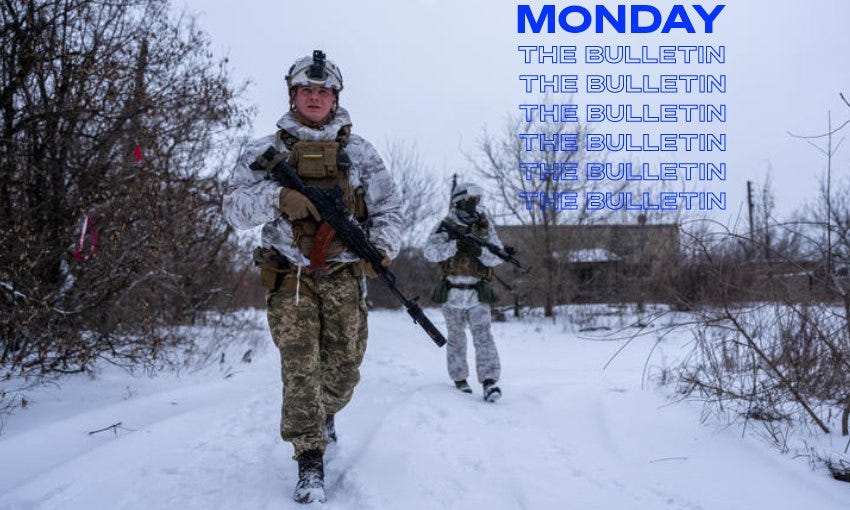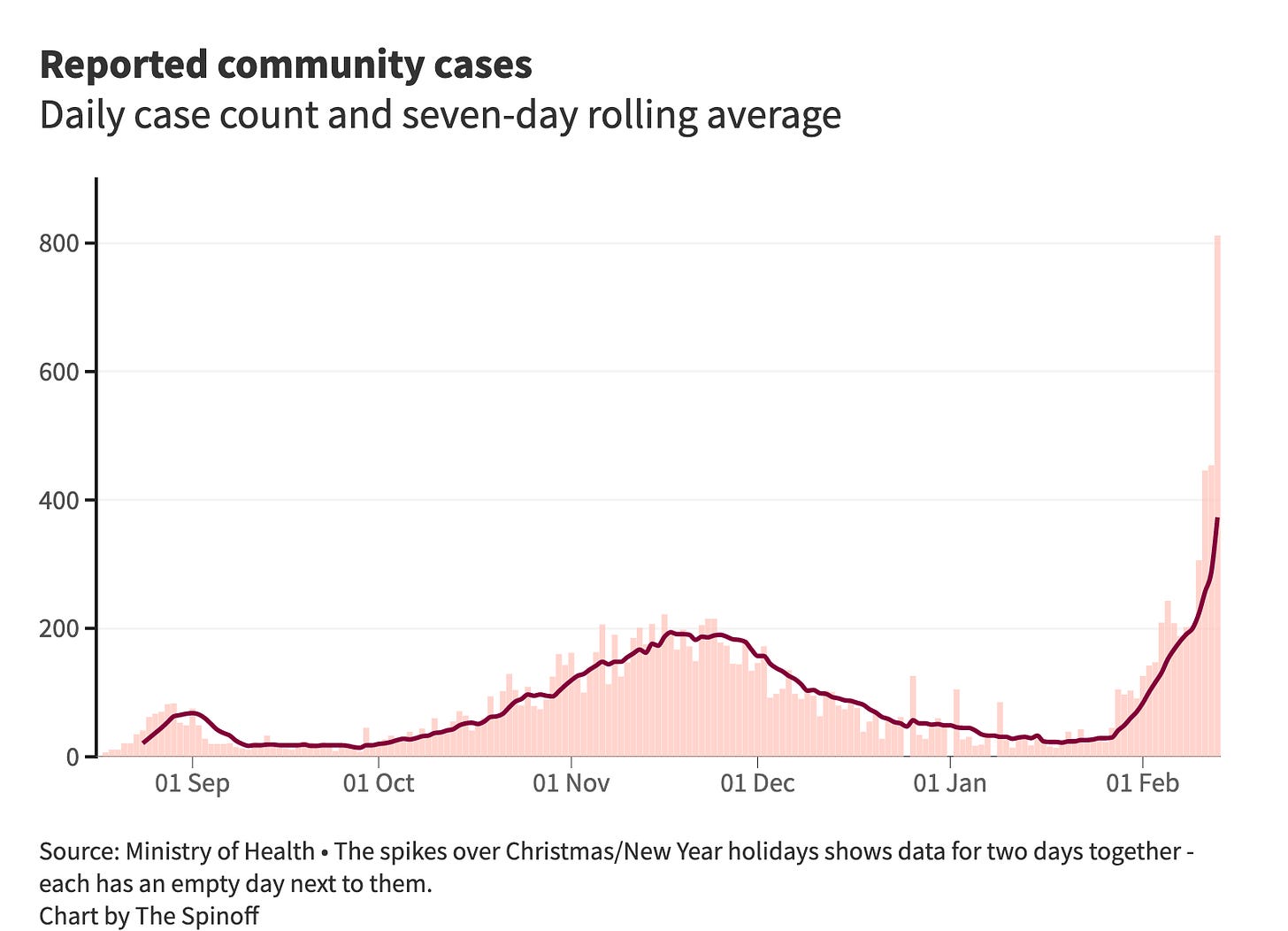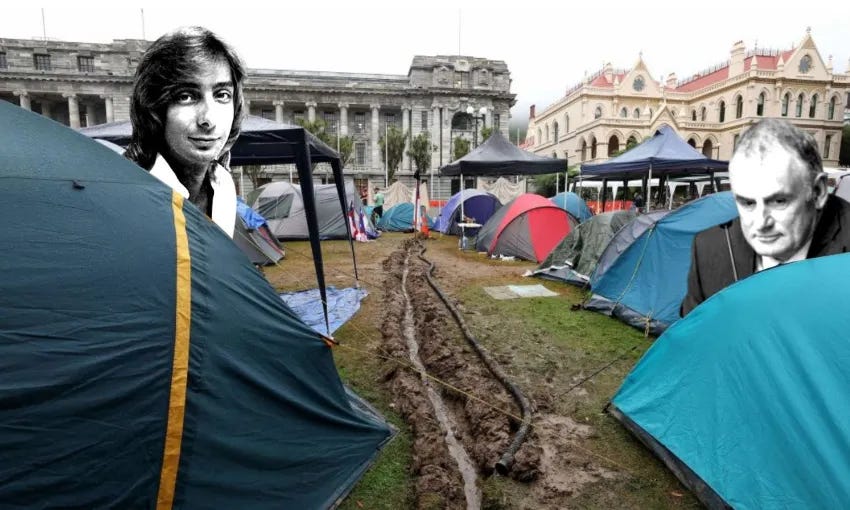NZ responds to war warning in Ukraine
Wellington has told all New Zealanders to leave the country immediately as western embassies are evacuated
Mōrena and welcome to The Bulletin for Monday, February 14, by Justin Giovannetti. Presented in partnership with Z Energy. Happy Valentine’s Day.
In today’s edition: Omicron cases jump; protest continues at parliament; Ardern to speak at Harvard; but first, a worsening security situation in Ukraine.
Ukrainian soldiers in Avdiivka, Ukraine on 24 January. (Image: RNZ/Anadolu Agency)
It’s time for New Zealanders to leave Ukraine immediately. The foreign minister issued the blunt message over the weekend, warning any New Zealanders left in Ukraine that they won’t be able to depend on Wellington to evacuate them if war breaks out. Russian troops have been massed on the Ukrainian border since before Christmas, but New Zealanders in Kyiv told One News that “things seem to have taken a bit of a turn” over the past few days and they’re now booked on commercial flights to leave. Many can’t come back to New Zealand directly because MIQ remains a challenge.
“The continuing and unprecedented build-up of Russian military forces on its border with Ukraine is deeply concerning. Aotearoa calls on Russia once more to take immediate steps to reduce tensions and the risk of a severe miscalculation,” foreign minister Nanaia Mahuta said in a statement.
With a pandemic raging, a major international crisis is the last thing many people want right now. Embassies are being evacuated from the country, with Canada and Australia pulling back their diplomats over the weekend to Lviv, a city in the country’s far west further away from Russian tanks. New Zealand doesn’t maintain an embassy in Ukraine. As the diplomats leave, Nato is pushing heavy military hardware east. Meanwhile, Russia has started massive life-fire military exercises both north of Ukraine in its ally of Belarus and south on the Black Sea. As The Guardian reports, the Russian president has made a list of demands to end the standoff: He wants Nato to leave eastern Europe and Ukraine to officially recognise Russian control over the Crimean peninsula, which Russia invaded and annexed in 2014. Vladimir Putin’s ambition is to reestablish Russian influence over eastern Europe. To which the US, its Nato allies and the democracies of eastern Europe have responded with a nyet.
What does this mean for New Zealand? The Bulletin turned to Robert Patman, international relations professor at the University of Otago, for answers. In a major way, the crisis highlights one of New Zealand’s main foreign police ambitions. If one of the few countries to every give up its nuclear weapons is invaded by a neighbour, it starts to shred New Zealand’s campaign to ban weapons of mass destruction.
"NZ is non-nuclear power and Ukraine gave up its nuclear weapons in December 1994, in return for full Russian recognition of Ukraine’s territorial integrity and sovereignty. In 2014, Russia breeched international law by annexing Crimea. In 2022, Putin’s regime is poised to further break international law in a bid to create a sphere of influence in east Europe,” said Patman.
“This is a Munich moment and the crisis is not just about Ukraine.”
The road to peace. The New York Times’ Morning newsletter has looked at an emerging “alliance of autocracies” that sees the current chaos in Ukraine as a positive sign for the future. While there’s a view that the situation might just be a Russian bluff to get concessions out of a distracted west, that hasn’t stopped European leaders from pondering what they can give up to get a diplomatic solution.
The Economist (soft paywall) has written about French president Emmanuel Macron’s suggestion last week that “Finlandisation” might be a good approach. If the east vs west showdown in Ukraine isn’t enough of a cold war throwback, Macron’s proposal is right out of the 1940s. The idea is that Ukraine would be officially neutral, balanced between Russia and the west. Though as many have warned, the idea might deter an invasion, but it would put Ukraine firmly under Russian control. Even in Finland, the good old days of Finlandisation are seen as no such thing. The coming week will likely tell us much about Ukraine’s fate and the limits of western power.
Quality journalism shouldn’t be a privilege. This is why we are determined to keep our content freely available without a paywall. Help us continue to do so by joining The Spinoff Members today.
Is your organisation keen to support The Spinoff? We would love to hear from you – contact us today to find out more about our organisation memberships.
Move to phase two of omicron plan imminent after unprecedented jump in cases. A record 810 community cases were detected yesterday, nearly double the record set only a day earlier. This jump in cases was expected from the highly infectious omicron variant. Most New Zealanders have responded the right way, with a surge in boosters. As the NZ Herald reports, the second phase of the omicron response could come from midweek as cases move above 1,000 a day.
As a reminder for phase two. It means a shift towards rapid tests, contact tracing is largely automated and contacts only isolate for seven days. The country’s approach shifts from stamping out omicron to blunting the worst of it.
In the graph above, November’s delta peak is already flattening in comparison to omicron. The Spinoff’s Covid data tracker has the latest figures.
Police say ‘plan is not to wait this out’ as protest continues at parliament. There are growing concerns about sanitation around parliament after a weekend of heavy rains, with Stuff reporting that police are worried about faeces on the grounds and children playing in the mud. A heavy police presence is expected today as protesters have been told to remove their vehicles and give Wellingtonians their freedom back. There are also growing reports of abuse from protesters towards locals and school children, according to RNZ. The dean of AUT law school told One News that police might have to increase enforcement if protest behaviour intensifies.
A protest leader. The NZ Herald’s David Fisher (paywalled) has profiled one of the leaders of the protest. He writes that before creating the conspiracy-loaded website Counterspin, Kelvyn Alp started a para-military group, ran unsuccessfully in elections and was behind a failed gold mining scheme.
Countries with strong institutions and high levels of trust perform best. Following on Friday’s trust theme for this newsletter, Interest has looked at how trust has impacted Covid-19 responses around the world. Unsurprisingly, trust was a much better measure of how countries coped with the pandemic than health or research capacity. The US and UK were ranked at the top of the “best prepared list” prior to Covid-19, while places like Vietnam and New Zealand were near the bottom. The massive, costly real world experiment of the last two years has disproven that theory and turned focus to interpersonal connections. This goes beyond pandemics. With climate change and massive ongoing disruption from globalisation, there’s a real premium on rebuilding trust between each other and the institutions built to serve us.
Rotorua’s Rainbow Springs nature park to close after 90 years. After outlasting the Second World War and nearly a century of economic wobbles, Rainbow Springs now faces closure due to mounting losses from the pandemic. As Te Ao Māori News reports, Ngāi Tahu says it will rehouse the national kiwi hatchery at the nearby Agrodome and find places to send the rest of the wildlife.
Ardern to speak at Harvard during US tour. The Dominion Post’s Anna Fifield revealed this morning that the prime minister is set to deliver Harvard’s commencement address in May. The highly coveted slot hasn’t been confirmed by either the university or Jacinda Ardern’s office, but is expected to be announced soon. The in-person speech would coincide with a trade mission to the US she’s planning to lead later this year, with a White House invitation expected as well.
Got some feedback about The Bulletin, or anything in the news?
Get in touch with me at thebulletin@thespinoff.co.nz
Barry Manilow, Trevor Mallard and a trench. (Image: Marty Melville/ AFP/Getty)
Right now on The Spinoff: Toby Manhire writes about the antics the speaker of parliament is employing against protesters. Alex Casey speaks with experts about concerns surrounding omicron and apartment living. Alex Casey reports on the oral history of the “PTMTINYP” line from Shortland Street. Alex Casey (that’s three excellent stories from one writer) finds out why there’s a giant Cartman in one of Auckland’s poshest suburbs. Scarlett Cayford reviews the sequel to Rachel’s Holiday and loves it.
Crusaders pre-season defeat offers a preview of coming season. Super Rugby Pacific is set to start this coming weekend in a Covid-free bubble centred on Queenstown. Before the unusual season, Stuff reports on a series of pre-season games that preview how new coaches, new recruits and new lines will handle the coming months of play.







